
Breadcrumbs navigation
The latest in IR - summer book round up
Welcome to our quarterly book round up. Each quarter we bring you updates on the latest International Studies releases by BISA members. To be included in the next update contact Communications Manager, Chrissie Duxson: Chrissie.Duxson@bisa.ac.uk
Queering Governance and International Law
The Case of the International Criminal Tribunal for the former Yugoslavia
Caitlin Biddolph
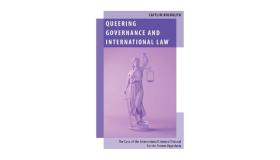
Caitlin Biddolph is a Lecturer in International Relations at the University of Technology Sydney (UTS), Australia. Her research focuses on queer international relations, with an emphasis on international law and transitional justice. More broadly, she is passionate about researching and teaching through queer, feminist, postcolonial, and decolonial approaches to global politics.
Blurb
International law is brought into existence by actors from a variety of perspectives--international lawyers, state representatives, bureaucrats, and organizations--and as such, international law is riddled with contradictions. It is violent and violating, reducing complex lives and histories to "good" (lawful) and "bad" (criminal) bodies subject to protection, praise, or punishment. And yet it has potential to be a means of hope, resistance, and justice for victims, survivors, and oppressed communities. In Queering Governance and International Law, Caitlin Biddolph examines the international legal space through queer, feminist, and postcolonial lenses. In doing so, she queers governance and international law, exposing the gendered and sexualized meanings behind legal concepts like violence, and critiquing legal status quos so that more transformative, liberatory, and queerer paths to justice might be dreamt and manifested within and beyond international law. Using as a case study the International Criminal Tribunal for the former Yugoslavia (ICTY), Biddolph traces the cis-heteronormative underpinnings of legal violence, and identifies ways that violence can be resisted and international law subverted to dismantle the very gendered and racial hierarchies it has reinforced.
Find out more and purchase the book via the Oxford University Press website. Receive a 30% discount using the code AAFLYQ6.
The BISA Gendering in IR Working Group are holding an online event with Caitlin about the book on 14 October 2025 and you can register to attend now.
The War on Terror
Andrew Thomson and Rubrick Biegon

Andrew Thomson is Senior Lecturer in Politics and International Relations at Queen's University Belfast.
Rubrick Biegon is Lecturer in International Relations at the University of Kent.
Blurb
The War on Terror has remained an enduring feature of American foreign policy for over two decades. This short history positions the War on Terror within the broader context of Cold War interventionism and the rise of various transnational threats to American (and global) security during the late twentieth century. It introduces readers to the main concepts, debates and theories which have been used to understand and make sense of the War on Terror. These include approaches that frame it as a disparate set of policies aimed at reducing the risk of terrorist attacks against American citizens at both home and aboard; as part of a project aimed at helping maintain the United States' dominant position within international politics; and as an idea intimately bound up with perceptions of American national identity and America's place in the world. In this way, the book aims to show how the War on Terror has changed global politics, as well as why it has been fought and proven so difficult to end despite multiple failed attempts at course correction. The book is ideally suited for courses on international security, American foreign policy and contemporary world politics.
Find out more and purchase the book via the Agenda Publishing website.
Timelines for Modernity
Rethinking Periodization for Global International Relations
Barry Buzan
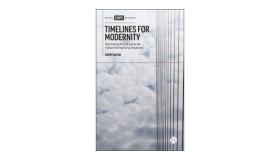
Barry Buzan is Professor Emeritus at the London School of Economics and Political Science and a Fellow of the British Academy.
Blurb
This groundbreaking book develops a new periodization for understanding contemporary international history. It challenges West-centric approaches by setting up timelines appropriate for a global approach to International Relations.
Shifting the focus beyond great power wars, it incorporates economic, societal and environmental changes to redefine what constitutes significant historical moments for both the Global North and South. It uncovers pivotal turning points in the 1840s, 1970s and now, that highlight the formation, dominance, unravelling and replacement of the Western world order. It offers new foundations for understanding both how we arrived at where we stand today and what might lie ahead.
Find out more and purchase the book via the Bristol University Press website.
Transatlantic Relations after the Russian-Ukrainian War
A Neo-realist Approach
By Lorenzo Cladi
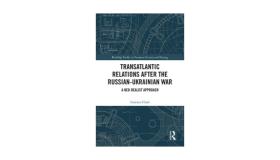
Lorenzo Cladi is Lecturer in International Relations at the University of Plymouth, UK, and has a PhD in International Relations from Loughborough University, UK. He is a convener of the BISA European Security Working Group.
Blurb
This book provides a neorealist explanation of transatlantic relations and explores key issues at the forefront of the relationship between the US and its European allies in the context of the Russia-Ukraine war.
Transatlantic relations, involving the relationship between the United States and its European counterparts, are an essential feature and a cornerstone of the foreign policy of many states. Whilst the transatlantic allies share a relationship that has been in place since 1945, the re-election of Donald J. Trump as US President, the continuing war between Russia and Ukraine, and unsettled issues around European strategic autonomy all pose questions on the state of the partnership. This book utilises a neorealist theoretical framework to tackle these questions. It argues that transatlantic relations continue to prosper and European states remain dependent on the US for their security, which is made viable and necessary by means of dealing with collective threats to the security of transatlantic allies, of which the Russian invasion of Ukraine is the most obvious recent manifestation. The book also deals with other notable case studies of transatlantic relations, such as the French intervention in Mali and the US withdrawal from Afghanistan.
Find out more and purchase the book via the Routledge website.
African Climate Futures
Carl Death
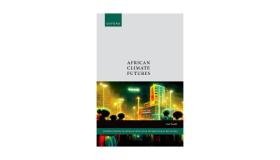
Carl Death is a Senior Lecturer in International Political Economy at the University of Manchester. He was previously at the Department of International Politics, Aberystwyth University, and the School of Law and Government, Dublin City University. His work focuses on environmental politics in Africa with a particular interest in critical and postcolonial approaches.
Blurb
African Climate Futures shows how climate-changed futures are imagined in Africa and by Africans, and how these future visions shape political debates and struggles in the present. Scientific climate scenarios forecast bleak futures, with increased droughts, floods, lethal heatwaves, sea level rises, declining crop yields, and greater exposure to vector-borne diseases. Yet, African climate futures could also encompass energy transitions and socio-economic revolutions, transformed political agency and human subjectivities, and radically reparative more-than-human climate politics.
At the heart of the book is an original and interdisciplinary approach. It studies official climate policy strategies and fictional texts side-by-side, as ecopolitical imaginaries that envision low-carbon, climate-changed futures, and narrate pathways from 'here' to 'there'. It discusses net zero strategies from Ethiopia, The Gambia, Nigeria, South Africa, and Zimbabwe and draws on postcolonial, feminist, and queer theory, arguing that Africanfuturist climate fiction can inspire more radical, reparative, more-than-human ecopolitical imaginaries. These stories can help us to understand the debts we all owe, imagine what reparations might entail, and explore the contours of living convivially alongside more-than-human others in heterotopian, climate-changed futures.
Find out more and purchase the book via the Oxford University Press website.
Author Carl Death has also recently written an article titled 'Can we imagine what a future climate-changed world will be like?' for our Environment and Climate Politics Working Group.
The Psychic Lives of Statues
Reckoning with the Rubble of Empire
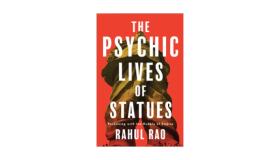
Rahul Rao is a Reader in International Political Thought in the School of International Relations at the University of St Andrews, and Professorial Research Associate at SOAS University of London. He is the author of two books – Third World Protest: Between Home and the World (2010) and Out of Time: The Queer Politics of Postcoloniality (2020), both published by Oxford University Press. He is a member of the Radical Philosophy editorial collective.
Blurb
From Cape Town to Bristol and Richmond, statues have become sites of resistance and contestation of our imperial past and postcolonial present. The Psychic Lives of Statues by Rahul Rao offers an insightful exploration of these global controversies, demonstrating that beneath their surface lie deeper struggles over race, caste, and the politics of decolonisation.
Rao takes readers on a journey through South Africa, England, the US, Ghana, India, Australia, and Scotland, revealing how statue controversies have dramatically rearranged the canon of anticolonial political thought. By examining these debates through a personal and literary lens, Rao addresses the multifaceted issues of justice, cultural memory, and belonging.
The Psychic Lives of Statues examines both the toppling of colonial statues and the raising of postcolonial ones, demonstrating that the statue form as a medium of representation and a bid for immortality is by no means obsolete. Engaging with artists, scholars, and activists, Rao provides fresh perspectives on how societies grapple with and reinterpret the past and present through iconography.
Find out more and purchase the book via the Pluto Press website.
If you're a BISA member and you'd like your book included in next quarter's round up, email Communications Manager, Chrissie Duxson: Chrissie.Duxson@bisa.ac.uk. Please include the title, blurb and a link to where the book can be purchased. If you are able, you can also include details of any discount available, but of course this is not required. The book should have been published a maximum of six months prior to your email.
Top photo by Phil Hearing on Unsplash